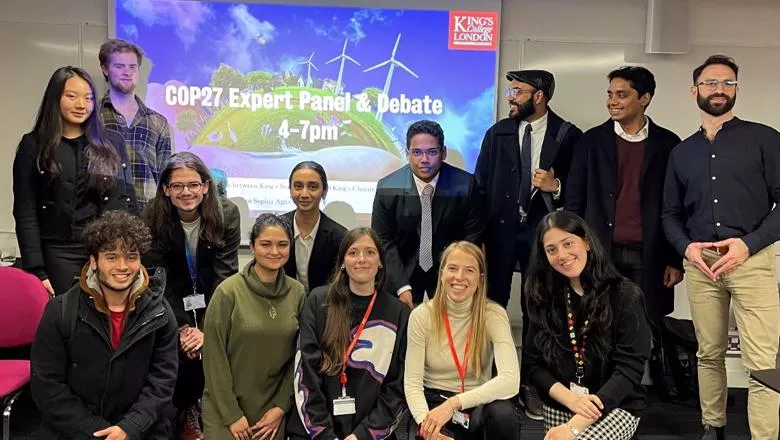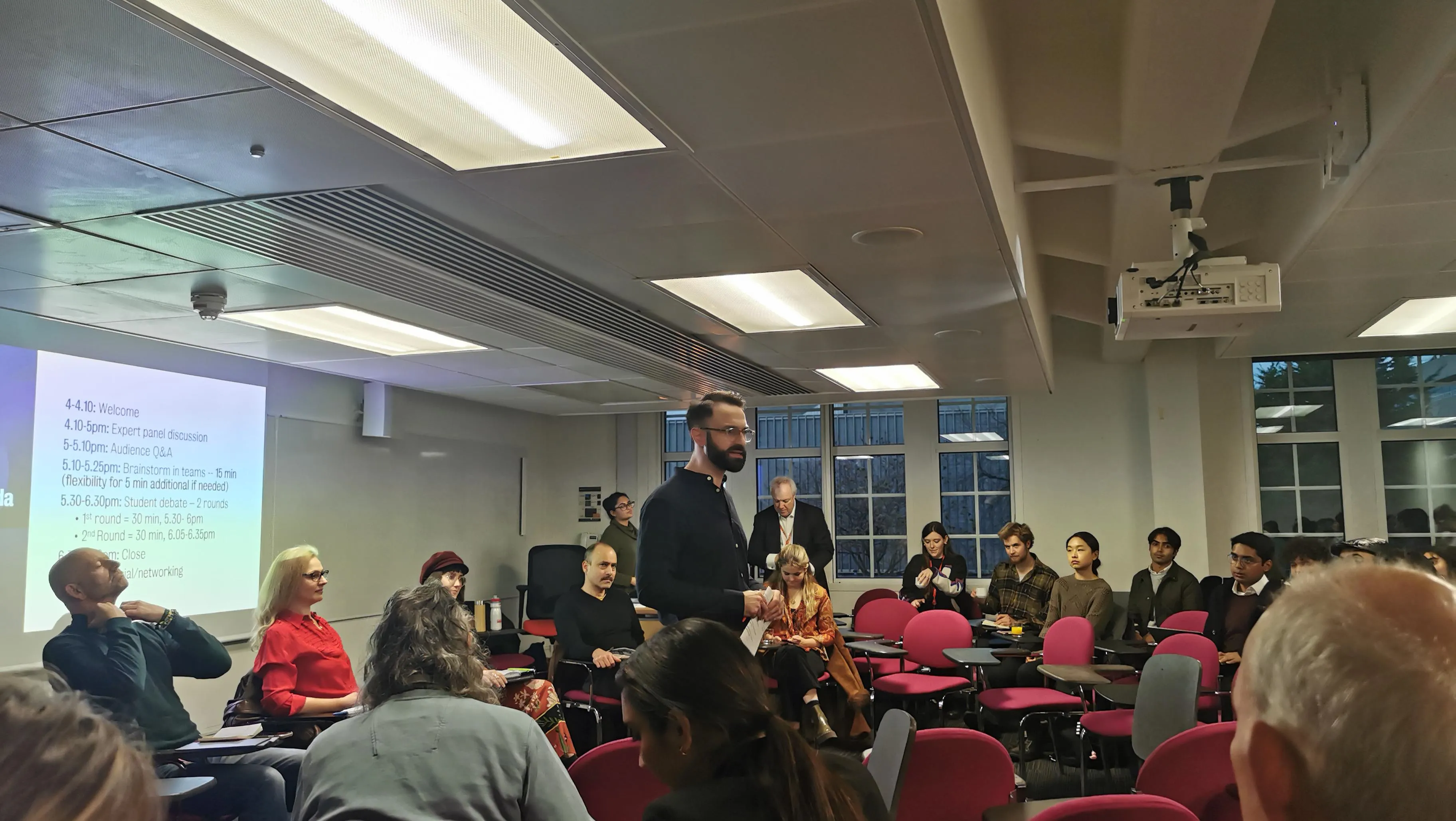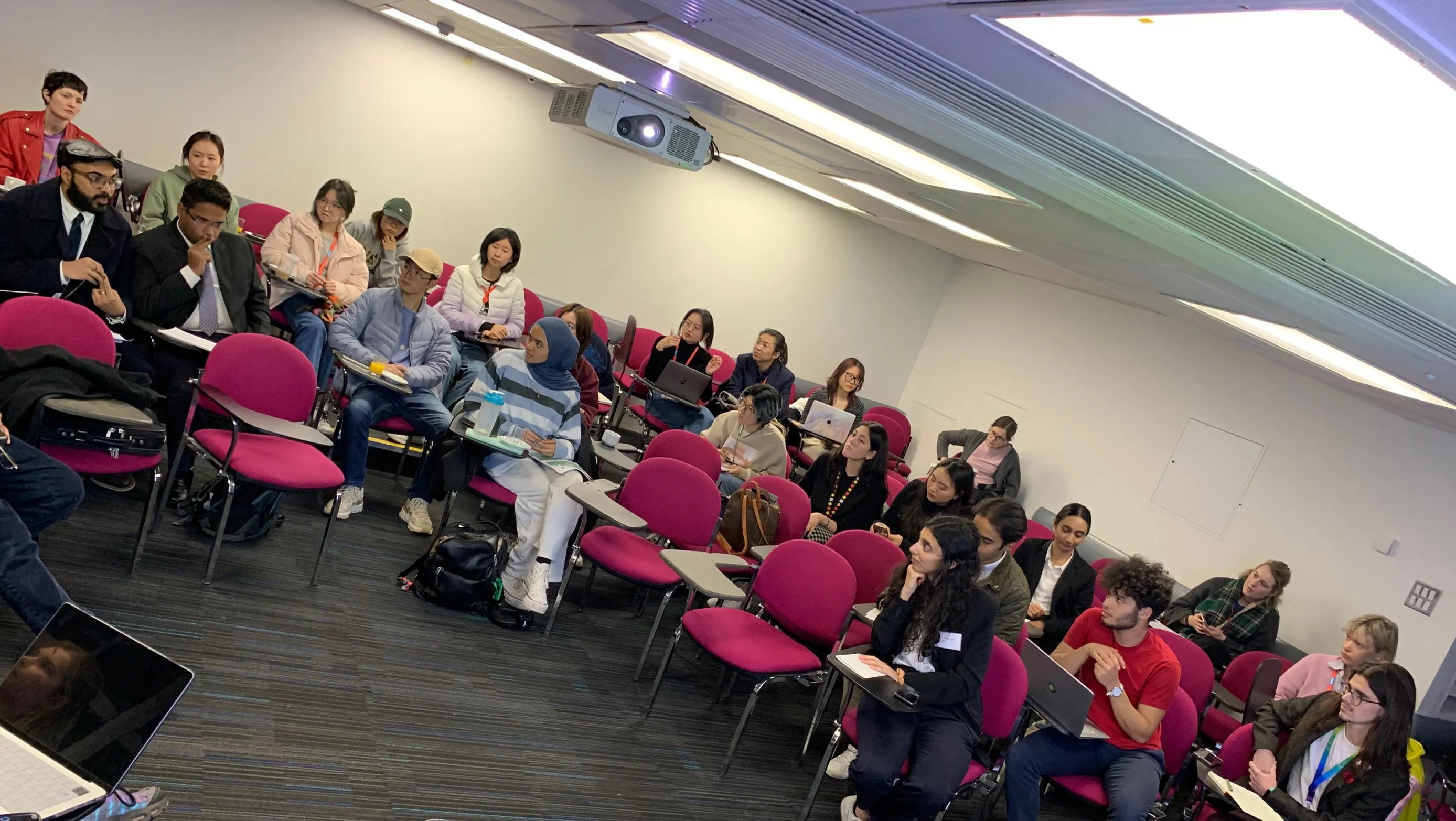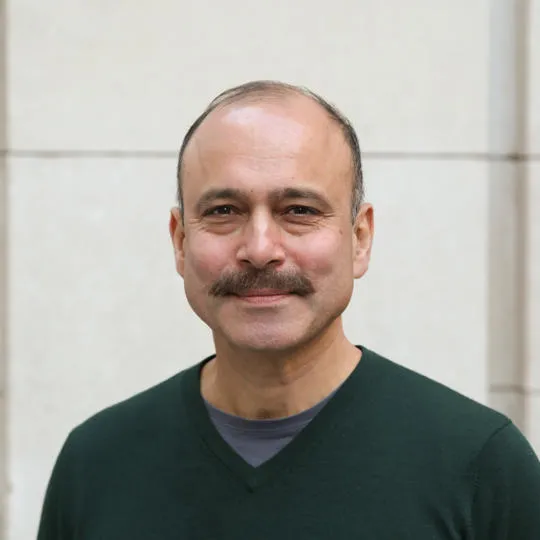I wanted to organise a pilot event like this to encourage wider debate about the future of ourselves and our planet based on multiple perspectives (as reflected in our panel) and to create a space for civil discourse to reflect on COP27 and climate strategy solutions. Experiencing the event finally unfold was surreal and I was overcome by the level of interest and engagement from students across the different universities.
Sophia Agha, King's Neuroscience MSc graduate
15 December 2022
Experts and students highlight the need for decisive climate action at COP27 debate hosted by King's
Students from four London universities come together to debate the key challenges around COP27.

Last month, students from City University, the London School of Economics, the Royal College of Art, and King’s College London came together for a debate focused on the climate summit COP27.
COP27 - the 27th United Nations Climate Change Conference - was held from 6 to 18 November 2022 in Sharm El Sheikh, Egypt. During this annual conference, Heads of State, ministers and negotiators, along with climate activists, mayors, civil society representatives and CEOs meet to agree on the way forward to address the climate emergency.
This event was a collaboration between King’s Sustainability Team, King’s Climate Action Network, and King’s Climate Action Society, driven by King’s neuroscience alumna Sophia Agha who has been volunteering with the Sustainability Team.
The panel
The event kicked off with a panel discussion with King’s professors Megan Bowman and Daanish Mustafa, and leading climate activists Sam Baker and Jessica Kleczka. They discussed the urgency of the climate crisis, the gap between pledges and action, the challenges of decarbonisation, and climate justice.
Megan Bowman described three main obstacles to climate action: short-termism and self-interest, fear (of change) and overwhelm, and business-as-usual inertia. Sam Baker highlighted these challenges with an interesting statistic that “75% of global business leaders claimed that COP27 will generate the desired outcomes to enable progress towards the Paris Agreement”. Sam considered this blindly optimistic at best, and a diversion when we need to grasp the scale and severity of both the issue and our paltry response. Unfounded optimism in business-as-usual inhibits change. As Daanish Mustafa put it, discussions seem to be centred around: “how do we change so that we do not have to change”.
There are also important levers we can leverage to bring about the desired and needed change. According to Megan Bowman, these include law and regulation, and finance. Despite challenges standing in the way including trust and structural gaps, it is possible to bring together the needed finance. As Jessica Kleczka mentioned, fossil fuel profits alone could cover most of the shortfall in climate finance.
So what can we do? With climate anxiety on the rise, Jessica Kleczka emphasised how “giving into despair is not an option”, as “scientists are telling us that it is not too late but that every fraction of a degree matters”. However, before we can change, we have to imagine a better world. The panellists highlighted how – by having this vision - we can become activists in our own ways, whether it is inside a company as an employee or shareholder, inside a university by embedding it into teaching and learning, or through everyday choice-making. According to them, an activist can be anybody who is trying to drive positive change.
The panel was moderated by Atilla Yücel who is a postgraduate student at King's, a committee member of King’s Climate Action Society, and an ex-policy advisor for finance and sustainable development.

The debate
During the debate, teams from the various universities addressed the following question: “should historically high emitters compensate climate-vulnerable communities for climate losses (i.e. the 'cost' of disasters, displacement, foregone opportunities)?”
Those in favour highlighted the moral responsibility of historically high emitters to treat the communities they have wronged. “It is a principle we all believe in. If you cause damage to your neighbour, you pay for it. Why would this not be the case internationally?” (City Debating Society). It has to be considered against the centuries-old context of colonialism, racism, and capitalism. As one of the teams from LSE put it: “Loss and damage is not a charity – it is justice”. In terms of sourcing the money, they mentioned various opportunities, including ending state subsidies on fossil fuels and reinvesting this money into a loss and damage fund.
The team debating against the question agreed with the injustice of the current situation but argued that monetary compensation was not the way forward. According to them, this focuses on the past instead of the future, whereas their efforts should prioritise large-scale and systematic climate action to avoid even worse impacts on these climate-vulnerable communities. They highlighted issues around determining the amount of compensation, who the contributors and thus the payers should be, who the recipients are, and how the money could reach them. “Compensation is tokenistic. Money cannot compensate for the loss of life. Money should instead be invested in restoration, mitigation, and prevention.” (LSE debate team).
The other teams agreed with the continuing importance of mitigation efforts but argued that in this unjust situation, it cannot be a question of either/or – mitigation actions and loss & damage support have to be pushed forward simultaneously. As the discussion evolved, participants began to explore the extent to which loss & damage is in the self-interest of the payer – it is not only about moral duty.

What is COP27 not talking about?
After this debate, attendees had an open discussion about what COP27 is not talking about. One of the issues that was raised was the fact that many voices are not heard at COPs. This was a particularly controversial topic at COP27 where protesters were silenced due to the human rights situation in Egypt, whereas civil society engagement should be one of the most important aspects of COPs. On the flip side, the question of whose voices are heard too much was also raised, pointing at the more than 600 fossil fuel lobbyists at COP27 who outnumbered the delegation of any single country except from the United Arab Emirates (hosts of COP28).
How climate finance is funded was raised citing that the World Bank was criticised for spending too little overall. The World Bank responded that they provided $31.7bn of project financing for the climate in 2022. However, it was pointed out that this is mainly through loans rather than grants and is usually given to middle-income countries rather than the lowest-income. The Egyptian Environment Minister Yasmine Fouad told COP27 that Africa needs up to $41.6 trillion to deal with the consequences of climate change by the end of the decade. The attendees concluded that the way the World Bank directs its funds needs to be readdressed but recognised that, currently, the UN has no mandate to formally intervene with the World Bank.
Moreover, there was an interesting discussion about the effectiveness of COPs overall. Do COPs enable the decisive action that is needed on a global scale, or are they a justification of the status quo? Is it a tick-box exercise for government leaders to deliver an ambitious speech while they continue to fall behind on action and implementation? Where would we be without these COPs: further ahead or - maybe more likely - even further behind? Finally, is “Conference of the Parties” the right name for such an urgent topic that should be easily understood by the wider public? Or would something like “Climate Emergency Action Now” be more appropriate?
The audience agreed that it is time for decisive actions and that this has to come from all areas of society including government, business, civil society, and the education sector - whether this is within the COP framework or not.
Stay in touch with King's Sustainability
In this story
Related departments
- King’s Climate & Sustainability
- Climate & sustainability researchers at King’s
- Centre for Climate Law & Governance
- Department of Geography
- King's Climate Research Hub
- The Dickson Poon School of Law
- School of Global Affairs
- Faculty of Social Science & Public Policy
- Geopolitics and Contested Development research group
- Urban Futures research group
- King's Water Centre
- Political Ecology, Biodiversity & Ecosystem Services
- Service at King’s
- King’s & London


